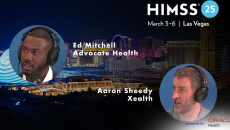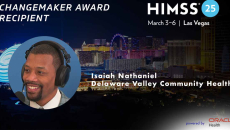Videos
Christine Stetler, a registered nurse and AVP of Solution Engineering at MedeAnalytics, says there needs to be a meeting of the minds between coders and clinicians to accomplish that goal.
There are many valuable use cases for robotic process automation, says Dr. Jonah Feldman of NYU Langone Health, including streamlining patient intakes and analyzing charts to determine where care can be improved.
Measuring digital maturity and building up analytics programs can help providers use AI tools to meet patient needs more effectively, says Natasha Ramontal, HIMSS senior digital health strategist.
Messaging tools, including automation, can help build trust in clinicians and encourage patients, says Ed Mitchell, Advocate Health's director of strategic partnerships, and Aaron Sheedy, Xealth COO.
A 2017 cancer diagnosis inspired Daymond John, The Shark Group CEO, to pursue improved health and longevity, as well as his mission to help others access and share their own medical data.
HIMSS25 sessions on change management, the upcoming government spending bill and suggestions for aligning interoperability goals with Trump administration policies are today's topics with our top journalists.
How HIMSS education and programs, such as CIO Connect, can benefit the professional development of healthcare IT specialists at all levels, per Isaiah Nathaniel, SVP and CIO at Delaware Valley Community Health.
The chiefs of three publications go over what they covered on the second day of HIMSS25, including EMRAM Stage 7 awards, the fate of telehealth and precision medicine.
The AI in Healthcare Forum, the Executive Summit and the inaugural Smart Health Transformation event all had a lot to say about artificial intelligence and its impacts. From Las Vegas, the HIMSS Media brand editors offer their perspectives.
AI and other digital tools are easing cognitive burdens for clinicians and enabling leaders to reallocate staff to higher-value tasks, says Whende Carroll, clinical informatics advisor at HIMSS.









